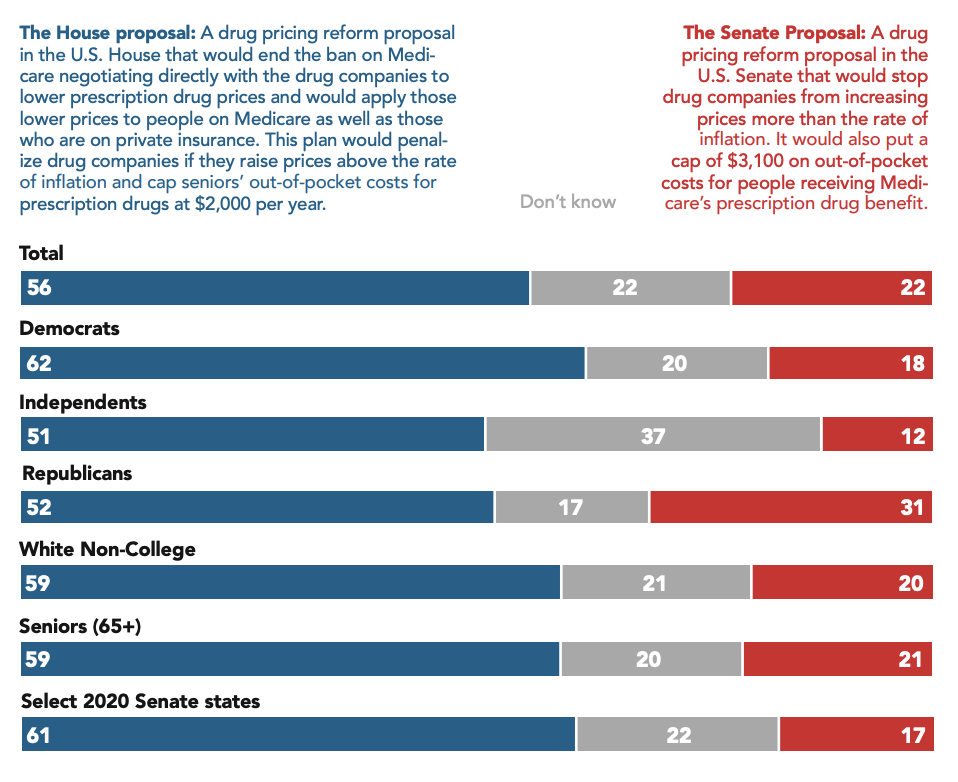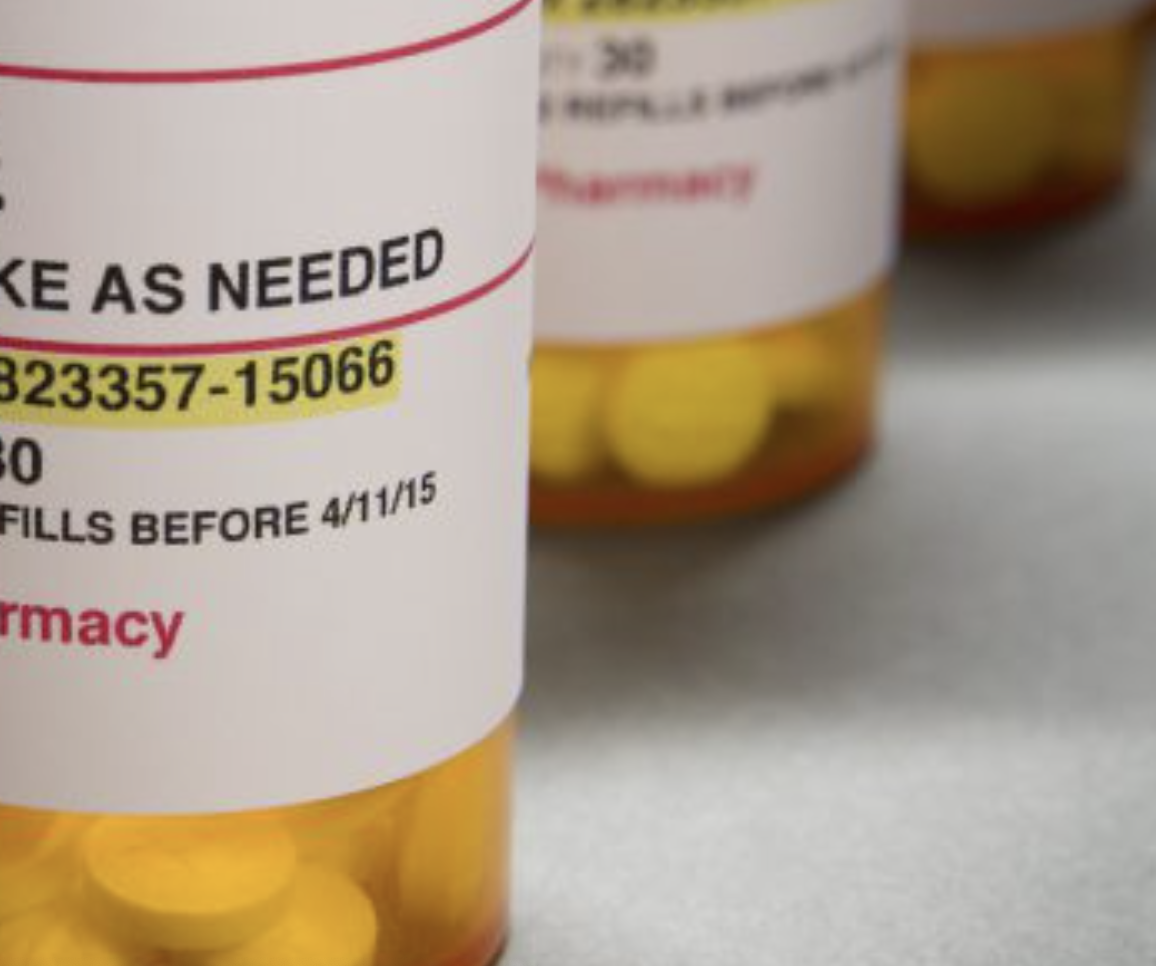Every month, we pick a few topics for exploration. The topics we select aren’t meant to cover every issue area facing the progressive community, but rather to give actionable advice on how to talk about key issue areas. We’ll be sharing our findings throughout the month, and in this volume we focus on:
When it comes to health care and drug prices, Americans trust Democrats in Congress, but how can progressives convert this trust into support for particular policies? Americans are very interested in policies to “lower drug prices,” and find the specifics of House Democrats’ reform proposal (HR 3) more appealing than a proposal in the Republican-led Senate.
I am text block. Click edit button to change this text. Lorem ipsum dolor sit amet, consectetur adipiscing elit. Ut elit tellus, luctus nec ullamcorper mattis, pulvinar dapibus leo.
The vast majority of Americans see the rising cost of prescription drugs as an important priority for Congress.
On the challenge of health care generally, the public continues to trust Democrats in Congress over Republican leaders. Democrats have held a strong lead on the issue of “health care” since Navigator began tracking the issue – 52% now say they trust Democrats in Congress on the issue, while just 36% trust Donald Trump. The 16-point edge is in line with a trend going back to the beginning of Navigator’s tracking. The advantage is especially large among independents (50% to 20%).
Americans trust Democrats in Congress on health care in general – and prescription drug costs in particular.
The trust gap in favor of Democrats is actually larger on “making prescription drugs more affordable,” than it is on health care overall. Specifically, the advantage on drug affordability is 21 points among the public overall, 16 points with seniors (age 65+), and 32 points with independents. Beyond the lead on “making prescription drugs more affordable,” Democrats also have a lead when the debate is framed as “standing up to drug companies that dramatically increase drug prices,” but the lead is more narrow (14 points).

There is still time to shape opinion on the issue.
When asked how much has been heard about drug pricing reform efforts in Congress, just 11% say they have heard “a lot” about it over the last few weeks – much lower awareness than the all-consuming debate over impeachment (72%) but also lower than other events such as Trump’s declaration of emergency at the border (33%) or warnings of a possible recession (23%). Even among the 34% who say the issue should be a “top priority,” just 18% have heard a lot about current reform efforts.
With details of the current debate over drug pricing yet to reach most Americans, progressives still have to make their case. When asked who between Republicans and Democrats in Congress is “doing the LEAST” about lowering drug prices, the share who are unsure rises to a third (32%), with Republicans getting the negative rating over Democrats, 38% to 30% – far smaller than the Democrats’ trust advantage on the issue.
Center the conversation on “lowering drug prices” – mechanisms and details matter, but advocates should always try to tie it back to the core objective.
The language and policy of drug pricing reform comes in varieties – prices are regulated, controlled, or negotiated. But the latest Navigator survey is clear: more than anything else, the language of “lowering drug prices” should be central, with specific policy mechanisms like regulation or negotiation taking a supporting role.
This is not to say the details don’t matter. Far from it: in an “informed” head-to-head between two dueling proposals in Congress – one in the Senate, the other in the House – there is a clear favorite (the House proposal).
Who is most responsible: companies, not political parties.
Americans do not trust Republicans to handle these policies but see drug and health insurance companies as the central actors, and messaging should start there. Asked which two entities are most responsible for drug costs, 76% say drug companies and 50% say insurance companies, compared to 14% who say Republicans in Congress.
Favorability ratings for drug companies (24% favorable, 66% unfavorable) and health insurance companies (38%/56%) also begin very low, making these companies an effective foil. However, advocates should not shy from linking politicians to the problem – more Americans (41%) see the influence of drug companies on policy via political donations as the key problem rather than rising prices (28%) or drug company profits (26%).
“Lowering,” not “regulating.”
Americans want Congress to be focused on lowering drug prices. This takes precedence over the specific mechanism or process for getting there. The advantage for “lowering drug prices” over alternatives extends across various political and demographic groups.

Americans prefer the House proposal.
When it comes to fixing this problem, Americans show much stronger support for a House proposal (HR3) that gives Medicare the power to negotiate, along with other differences, from a competing Senate proposal. Overall, the House proposal is preferred by a margin of 56% to 22%. Independents favor the House proposal by 51% to 12%, as do both Democrats and Republicans, and it also wins over seniors by 62% to 23% and white Americans without a college degree by 44% to 37%.

About The Study
Global Strategy Group and GBAO conducted a public opinion survey among a sample of 1,000 registered voters between October 3-7, 2019. An additional 114 interviews were conducted among political independents with no partisan lean, and an additional 500 interviews were conducted across the states of Arizona, Colorado, Georgia, Iowa, Kansas, Maine, North Carolina, South Carolina, and Texas. The survey was conducted online, recruiting respondents from multiple opt-in online panel vendors. Respondents were verified against a voter file and special care was taken to ensure the demographic composition of our sample matched that of the national registered voter population across a variety of demographic variables.

